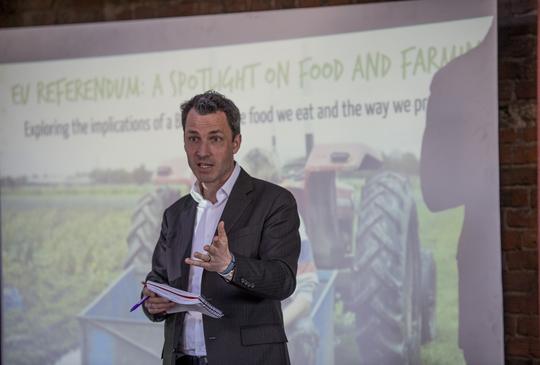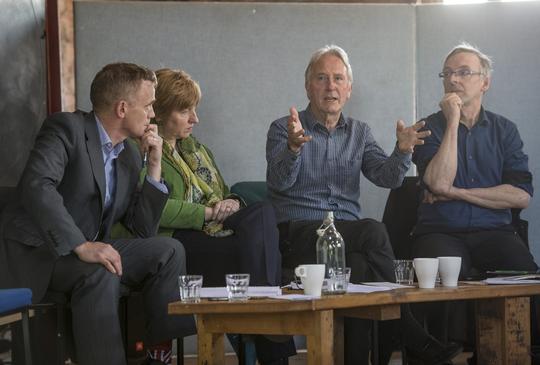
EU Referendum: A spotlight on food and farming
In June 2016, the UK Government will hold a referendum to determine whether or not the electorate wishes to remain part of the EU.
To date, there has been significant media coverage regarding the support each campaign has received from various political figures, often following a narrative that holds more interest in scaremongering and character assassination than informed debate.
It seems as if the public has largely been left to make their decision based on the credibility of the relevant proponents, and as yet, very few of the campaign figureheads have offered us much in the way of useful insights or intelligent discussion on what has been hailed as one of the biggest political decisions we will ever have the opportunity to influence.
Is it possible that this dearth of substance could reflect the political class's lack of faith in the general public's capacity to process complex information? Or is it more likely that there are so many unknown outcomes that it would be impossible to make an informed judgement either way?
It is clear that the number of variables following the referendum makes it unrealistic for mere mortals to predict every consequence of the vote, however this should not stifle critical consideration of many of the potential impacts of our decision.
One question that looms large for many people in the UK is how the result of the referendum could affect the way in which our food is produced and traded.
The potential implications of Brexit on food and farming was the focus of a recent meeting organised by the Kindling Trust and the Food Ethics Council in Manchester.
The event was attended by delegates from a range of backgrounds and professions with a variety of interests and concerns surrounding the referendum.
Given the current mist of confusion surrounding the issue, with members of the public attempting to wade through the slurry of personal insults and political game-playing, this calm and thought-provoking intervention was welcome.
The meeting was framed in a non-judgemental way, with the event's chair, Dan Crossley from the Food Ethics Council, stressing that the event was not being held with the aim of persuading the audience to vote in any particular way. However, the four speakers all presented arguments in favour of remaining in the EU and the meeting did not offer any pro-Brexit points of view.
Issues raised ranged from farm animal welfare and agricultural trade to environmental protections offered by EU legislation.

Perhaps contrary to instinctive concerns that farm animal welfare standards - which are currently dictated by EU legislation - could be lowered following an exit from the EU, Steve Webster, an independent consultant and the first speaker at the event, confirmed that this would not be the case.
This is because minimum standards would need to be upheld by British producers if the UK continues to trade with the rest of the EU. He explained that EU directives on animal welfare are detailed and specific, setting a firm baseline for the minimum welfare standards for four species of farm animals.
The EU provides legislation for the most intensive systems and for the most common practices including transport and slaughter, for example, the maximum angle of a ramp for entry into a transport container or the minimum distance between floor slats for indoor-reared pigs. By being part of the EU, the UK can influence these regulations, sometimes disproportionately.
For instance, the UK produces only 3% of the pigs in the EU, but can have a major influence on welfare legislation. These frameworks regulate for the minimum standards required, however, higher welfare standards are driven predominantly by consumer choice.
If Brexit led to negative economic impacts for the UK, higher welfare standards may be affected as a decrease in expendable income would cause the public to opt for cheaper, lower welfare meat. Increased market volatility and higher costs of import and export could also have a disproportionate impact on smaller farms, however these more general impacts are more difficult to predict.
If leaving the EU has worrying implications for animal welfare, the situation seems even bleaker when we direct our attention towards the natural environment, as Anne Selby from Lancashire's Wildlife Trusts explained.
The EU currently provides funding for a wide range of environmental initiatives from nature reserves and conservation to trialling agri-environment schemes and providing training opportunities. It is possible that if the UK were to separate itself from the EU money would still be spent on these endeavours.
However without the collective decision-making of the EU, the direction of the funding would be decided by the UK Government alone; a government which has not had an impressive track record for its devotion to the environment.
The EU also provides protective legislation such as the Birds Directive, the Habitats Directive and the European Water Framework Directive.
It could be argued that the Common Agricultural Policy (CAP) - another gift from the EU - has been a mixed bag in terms of its environmental benefits as it drives environmentally-damaging intensive agriculture.
Despite this, as Anne points out, improvements are being made. Brexit would mean that replacements to current environmental protection would need to be developed, which would be a complicated procedure, and it is thought that existing collaboration, regulation, and in particular, long-term legislation, has offered more environmental protection than would otherwise be present.
Charlie Clutterbuck, a soil ecologist and associate lecturer at MMU discussed workers' rights and the issue of cheap labour for cheap food, framing the process as a kind of 'modern slavery'.
He introduced the concept of the Agriculture Wages Board - versions of which already exists in Wales, Northern Ireland and Scotland - and he lamented the failure of a similar setup in England, due in part to intensive lobbying from influential groups like the National Farmers' Union (NFU).
This demonstrates that the UK Government is not generally supportive of heavier regulation for worker's rights and can be susceptible to lobbying by powerful business interests.
The issue of soil health was also discussed in terms of the east/west divide across the UK. The soil in the east of the country is less resilient than that in the west, due in part, to the types of agriculture practiced in each area. The west is typically pasture, where organic matter is returned to the soil and the east is arable and so is subject to erosion, carbon loss and compaction.
The EU attempted to introduce the Soil Framework Directive but the NFU and other large organisations lobbied the UK Government and the directive was abandoned. Charlie Clutterbuck believes that exiting the EU would lead to further deterioration of our soil and would signal a move further away from a social capitalism and towards a market-based capitalism.
Peter Ritchie from Nourish Scotland was the event's fourth speaker, who discussed the forthcoming referendum with reference to the recent Scottish referendum.
In comparison with the Scottish referendum, the length of time given to the public to debate the EU issue was described as an insult.
The speaker argued that two and a half months is not long enough to explore the issues in depth or to allow for change of opinion. Another concern is that the stay campaign is not properly mobilised and is currently propagating a campaign of fear, persuading UK citizens that the country is 'too poor, too small and too stupid' to leave the EU.
The debate so far has barely been troubled by the fact that EU countries are all in rapid transition and questions such as: 'what does it mean to be British?' and 'where do we want to be heading?' are not being asked.
The debate is still being led by institutions that do not reflect the UK's diversity and the narrative still harks back to traditional national stereotypes and name-calling that should have been abandoned long ago.
It was argued that the hysteria surrounding immigration is unwarranted, as the UK relies on EU workers to support its economy and that the 'closing our borders' argument for leaving the EU is nonsensical because free movement of labour is likely to be a pre-condition for Brexit.

Following the four presentations, other issues, including the Transatlantic Trade and Investment Partnership (TTIP) and Genetically Modified (GM) crops, were raised.
The UK Government is campaigning for the TTIP process to remain secret and currently there is one room in Westminster where MPs can go to read TTIP documentation.
No electronic devices are permitted in the room and following this restricted viewing procedure, MPs are not permitted to speak about what they have seen outside that room.
The UK Government is keen for TTIP to go ahead, however France and Germany are more concerned about the public disapproval of the proposed partnership, making the possibility of halting the process more likely if we remain in the EU. Whilst being a member of the EU has brought us TTIP, it has also given opponents a better platform to fight against it within Europe.
On the subject of GM crops, Brexit would almost certainly lead to more intense and powerful lobbying by large organisations without the buffer of EU regulation.
Currently, it is EU legislation that has dictated that we must label foods which contain GM ingredients, a move that is in contrast with the UK Government's position of consistently voting for fewer GM-related restrictions.
The EU would have a stronger rejection of GM without the UK, with the UK keen to cultivate GM crops on a larger scale.
Generally speaking, it is thought that Brexit would lead to further deregulation of the farming industry, for example the Government's recent attempt to allow the self-regulation of intensive chicken farms.
A lack of regulation in the farming industry could lead to an increase in factory farming, and a higher instance of food scares, similar to BSE or the more recent horsemeat scandal.
The Government also seeks to deregulate planning, which if left unchecked, could mean the destruction of many environmental protections.
The concerns presented at the event do not seem to be based on an inherent fear of an independent UK, but instead appear to have developed from a lack of trust in our current government to behave in a socially responsible manner.
An EU exit would mean a heavier reliance on our Government to maintain environmental legislation and avoid basing every decision on free market ideologies.
The key question is whether or not we can, or even should allow our Government sole control of matters that do not always benefit from a Laissez-faire approach to policymaking.
For more information on the Kindling Trust, please visit their website.
Photography credits: ID8 Photography
Contributor Profile
Rebecca St. Clair is a PhD student at the University of Salford.
She is currently working closely with the Real Food Wythenshawe team to investigate the value of urban food, under the supervision of Dr Michael Hardman.
Rebecca has spent the past year volunteering for food and environmental charities in London, following the completion of her MSc in the History of Science, Medicine and Technology at Imperial College, London.



